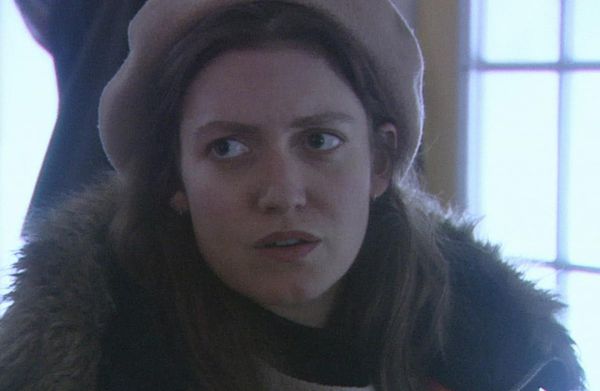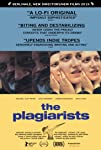Eye For Film >> Movies >> The Plagiarists (2019) Film Review
The Plagiarists
Reviewed by: Jennie Kermode

"We have more faith in what we imitate than in what we originate," said Bruce Lee. "We cannot derive a sense of absolute certitude from anything which has its roots in us."
Anna (Lucy Kaminsky) and Tyler (Eamon Monaghan) Find themselves in trouble when their car breaks down on a remote road. The flickery square format picture, the heavy soundscape, invite us to fear for them, far-from-original cinematic tricks echoing the subconscious landscape of middle class American liberal racism when older black stranger Clip (singer and keyboardist Michael 'Clip' Payne) approaches. They don't have much choice but to accept his support and go to his house to wait for a mechanic who, it soon emerges, will not be able to get there until the next morning. It's a small, claustrophobic space with a cupboard full of old video-making equipment which Tyler, who asserts that he's a filmmaker, is keen to try out. Nervous around each other, the three cook together and talk, trying to take the edge off thing. It's run-of-the mill stuff except for one powerful moment when Clip delivers a story about his childhood. Later, that story will reappear, throwing everything into turmoil.
Shot is a deliberately rough, clumsy-looking way, The Plagiarists comes across like an amateur video, suggestive of an attempt to recreate a real experience. Whose? Its director, Peter Parlow - who also purportedly helmed 2014's The Jag - is a curiously elusive character; there's some speculation that he may not actually exist. Certainly, the film is full of clever deceptions, perhaps part of the reason why it sets viewers on edge even if they don't notice it consciously. Payne has reportedly never met his co-stars, with his scenes shot separately despite the appearance of busy back-and-forth. Each character is deceptive in one way or another, though Anna seems to focus most of her efforts on deceiving herself. Tyler's clear bullshit about his career contrasts with his apparently genuine belief that he's better informed than the others about practically everything, an attitude that Clip observes with the quiet amusement of a man who has a good 30 years on him and, due to his social position, a lot more insight - yet his own situation is more complicated than it seems, and will ultimately leave Anna reeling, shocked not just by what she doesn't understand but by the concept of not being able to understand.
There are layers and layers of metatext here, and not just in the conversations about literature, one of which plays out over a radio discussion of book adaptation [film]You Were Never Really Here. The desire to simplify and take possession of other people's narratives echoes throughout, alongside the younger characters' clumsy attempts to fit those into a wider social narrative which they're loathe to address too directly. The film is unashamedly intellectual and yet amuses itself with its characters' overly enthusiastic attempts to understand everything around them as deeply as possible, often missing what's going on on the surface.
Many people will undoubtedly reject this film just because of the way it looks, though it's difficult to see how a more polished version could work. It's a clever little puzzle, the style one of its moving parts; the questions its poses, like everything else, are not what they first seem to be. Watch it closely. Let yourself feel irritated, even annoyed by the twist - then ask yourself why that is.
Reviewed on: 04 May 2020
















